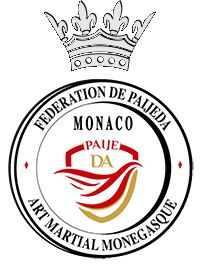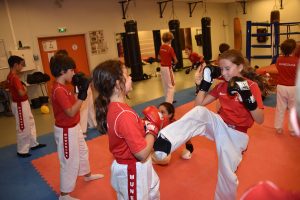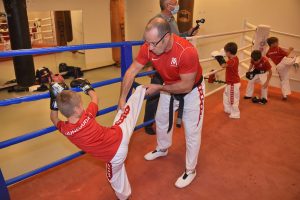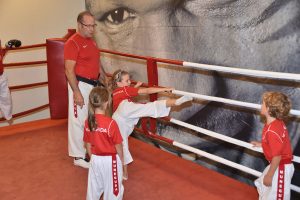
Different audiences
« We practice Pàijeda within the framework of a pedagogical approach and an environment adapted to the rhythm and specificities of each person. Different categories of Paijedals (practitioners of Pàijeda) will find a synthesis created around the theme of Personal Defence, but adapted and customised to their persona, as it is linked, on the one hand, to the age characteristics of the mixed audience it represents (children, teenagers, adults, seniors) and to the level of practice or, on the other hand, to certain specific priority objectives: leisure, competition, well-being, etc ». declare Claude Pouget
« To describe these different syntheses, we mention in this context: PÀIJEDA BABY (3-5 years), EDUCATIONAL PÀIJEDA CHILDREN (6-10 years) or TEENS (11-14 years), etc. or, on the other hand or from another perspective, as per the priority objective set, other than that of SELF-DEFENCE (qualified as PÀIJEDA in the strict sense), we particularly have PÀIJEDA KICK/THAI BOXING, PÀIJEDA LEISURE, or PÀIJEDA WELL-BEING » precise Claude Pouget
FOR SCHOOLS
“For school audiences, Pàijeda helps promote respect for the ethics and educational and humanistic values of sport.
It can play a decisive role in the access of young people to sport, while giving meaning to values such as « living together » and learning community life.
It fully contributes to the health and preservation of the physical integrity of the students.
It is a privileged asset for equal opportunities and for fostering youth citizenship » indicates Claude Pouget
PÀIJEDA BABY (3/5 years)
« PÀIJEDA BABY (3-5 years old) aims at helping the child blossom while facilitating their general development, before tackling the specific approach of martial arts. The priority here is psychomotor development (sensory-motor, emotional and relational skills).
The playful pedagogical approach translates into motor experiences (favouring balance, coordination, laterality, flexibility), as well as the development of the body mapping (knowledge of the body) in an adapted environment. Ethical values are introduced with the greeting, an expression of respect » précise Claude Pouget.
EDUCATIONAL PÀIJEDA CHILDREN (6-10) or TEENAGERS (11-14)
Educational Pàijeda Children (6-10) Or Teenagers (11-14) focuses on the ethical values of “living together”, which is an integral part of martial arts and a tool for development at these ages. The playful approach, integrating a motivating grade system, is oriented towards the acquisition of martial arts knowledge: young people and teenagers acquire and control the implementation of motor and mental commitments to succeed in simple actions. They practice motor skills courses or simple cooperative or controlled opposition exercises or games. From a social point of view, we build on respect for rules and ethical values.
PÀIJEDA LEISURE (ADULTS/ TEENAGERS FROM 15 YEARS OLD)
Pàijeda Leisure (Adults/ Teenagers From 15 Years Old) is offered for all and with adapted protection: in groups divided by level and type of session, in the pace of each practitioner, facilitating the individual development of a number of objectives.
Physically, it consolidates health, as it is a complete physical activity that promotes improved coordination and body control, muscle tone and strength, flexibility, bone density and cardiovascular capacity.
Mentally, it strengthens the mind and determination, it improves the capacity to manage emotions and stress, it boosts self-confidence, focus, relaxation capacities, as well as the sense of decision making and timing.
Socially, it encourages respect for rules and ethical values.



